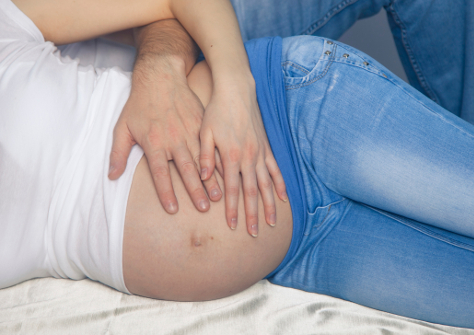Understanding baby's movements
When your baby moves in the womb, it's important to understand what you can expect

I’ve started to feel discomfort in my pregnancy, should I be concerned?
First of all, don’t be alarmed if you are feeling a little pain during pregnancy, it is perfectly normal for some discomfort to arise. It’s important to understand that the type and length the of pain may vary, depending on the stage of the pregnancy and the position of your baby. Keep in mind that every single pregnancy will feel differently, so don’t feel concerned if your friends’ or even your own previous pregnancies are resulting in varying levels discomfort.
What can cause pain in pregnancy?
Pregnancy pains coming from the womb area are generally caused by the baby moving around. This can be a full somersault, a twitch, kick, hiccup or punch. Pain caused by baby movement can actually be a positive health indicator that your baby is growing well, as it shows they are becoming stronger and more active, indicating positive mental and physical development.
When does pain from baby movements usually start?
You won’t feel any baby movement for the first three months of the pregnancy, due to the amount of insulation and the early
stage of development. During the 4-6 month period it is common to feel movements or pain from within. As the baby grows larger towards the end of the pregnancy, this is when the sharp painful feelings are more likely to occur as your baby becomes stronger, more active and has much less space to move around.
What does the pain usually feel like?
Pain from baby movements can vary a lot in intensity and durations, so don’t be surprised if you start to feel a new sensation. It is very common for it to feel like a stitch or stomach discomfort. Alternatively, the pain can also feel short and sharp, a similar feeling to being pinched. It is not uncommon for mums-to be to report very sharp and painful feelings around the vagina, some even refer to this sensation as ‘fanny daggers’.
Back pain is also very common in pregnancy, you can find in-depth information on the symptoms, causes and treatments from Bounty.com's back pain in pregnancy guide.
One thing worth noting is that if the baby remains in the same position for a long period of time, it can become painful or uncomfortable as it means there is pressure on the same point. If this happens, it is a good idea to try lying on your side, as this can relieve the pressure and also encourage the baby to shift slightly.
It is likely that at some point you will feel pressure towards the lower rear area of the womb, if this happens a trick that can quickly alleviate the pain is standing on your hands and knees and gently rocking side to side. It is best to do this on a soft carpet or a bed, as the extra weight can put strain on your wrists.
If you are experiencing pain in the hips, above the pubic bone, between your vagina and bottom, and down your thighs this may be Symphysis Pubis Dysfunction (or ‘SPD’ for short). For more information on the causes and reliefs of this be sure to check out Bounty.com's specific SPD guide.
What should I do if the pain continues?
Remember that pain caused by your baby’s movements is unlikely to be a cause for concern, however if the pain is severe and lasts for a while (even after trying the above methods) or if you have other symptoms, then be sure to contact your midwife or bring it up at your next antenatal appointment.